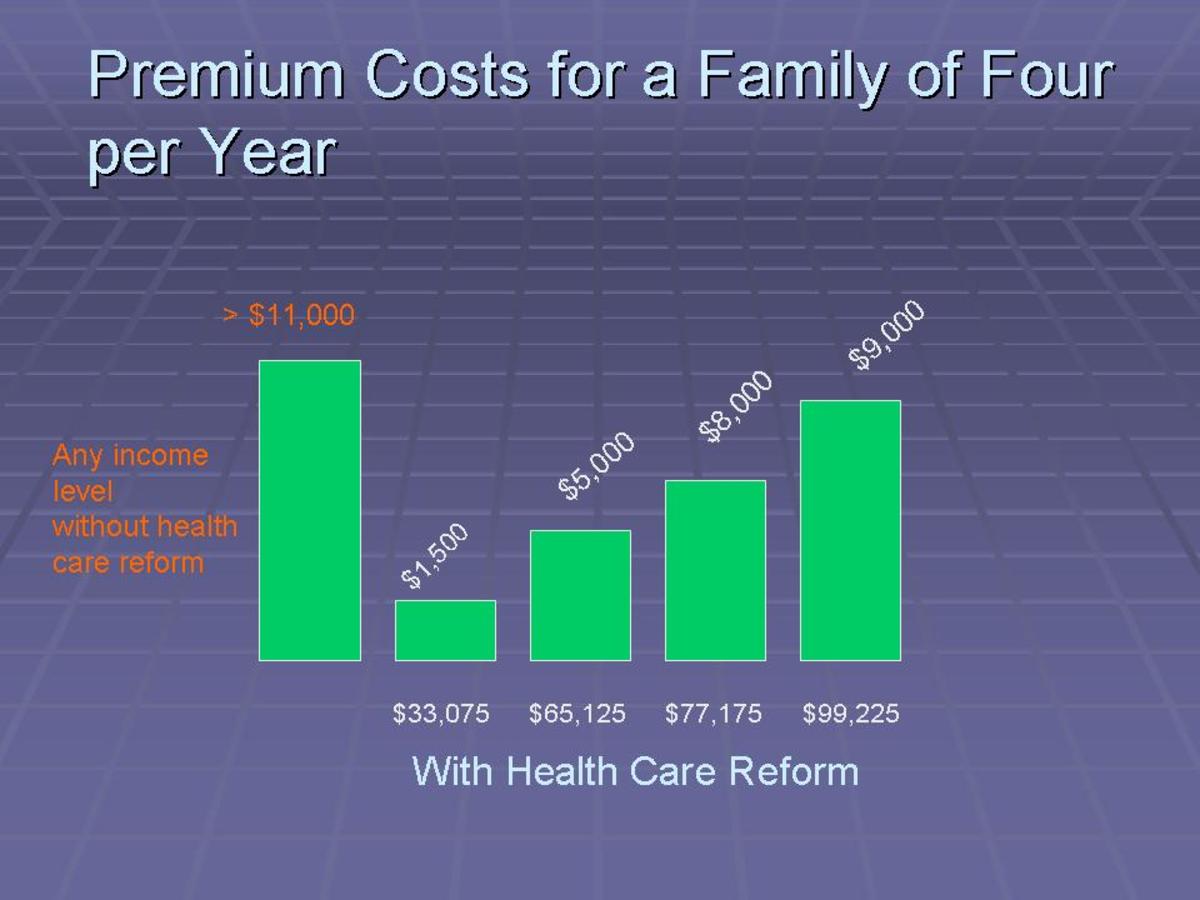Obamacare Will Provide Health Security, Unless Romney and Ryan Kill It

For middle-class families, a key challenge to early retirement is affordable health insurance. You will lose any employer-based insurance after you leave the workforce, but will be too young to quality for Medicare. One option is to wade into the scary world of non-group health insurance, but premiums are often out of control and you may not qualify due to a pre-existing condition. You might also be dropped even after you obtain insurance coverage should you develop any serious health problem. Luckily, there is a solution on the horizon which would provide affordable health insurance and consumer protections to many early retirees: The Patient Protection and Affordable Care Act (otherwise called, mostly by its detractors, Obamacare).
Finding Affordable Non-Group Health Insurance is Mostly a Middle-Class Problem
According to a 2011 report from eHealthInsurance, the average monthly non-group health insurance premium paid for a family was $414, ranging from $261 in Iowa to $932 in New York. This average increased by 5.6% from February 2010 to February 2011, or about double the rate of inflation. The average deductible for these policies was $3879, after increasing by 9.9% from February 2010 to February 2011. This report is available online at: http://news.ehealthinsurance.com/pr/ehi/document/2011_Cost__and__Benefits_Report_FINAL.pdf
For early retirees, or people contemplating early retirement, the current health insurance situation is actually more problematic than these averages suggest. The bigger problem is that, as things currently stand, health insurance companies are free to inquire about pre-existing conditions on your application, and to then either significantly increase your premium or even deny coverage altogether. They may also be able to drop your coverage if you develop a serious medical condition. Thus, in order to seriously contemplate buying a non-group health insurance policy to provide coverage during early retirement, you need sufficient resources to cover premiums that exceed the averages.
If you are wealthy like Mitt Romney, purchasing an individual health insurance policy is not a problem. According to the Tax Policy Center, the cash income of the top 1 percent of American households was about $506,533 in 2011. Thus, such a household would only need to spend about 1% of its annual cash income to purchase a family health insurance policy at the average annual premium of roughly $5000. Even if a member of this household had a family member with a pre-existing condition, or a family member who developed a health problem later on, it would easily have the resources to buy health insurance.
On the other hand, if you have a lower-class income, then you might well qualify for Medicaid or for a state-sponsored health insurance program. In either case, you would receive comprehensive health insurance coverage for little or no cost. There would be no reason to buy non-group health insurance.
Now, assume you are a middle-class early retiree with an annual household income of $50,000. You would need to spend about 10% of your annual income to purchase a family health insurance policy at the average annual premium of roughly $5000. You would also have a deductible of $3879, on average. While paying a full 10% of your annual income is bad enough, you would also have to anticipate lofty increases in both your premium and deductible as the years go by. To further compound your anxiety, you would need to worry about a member of your family developing a serious medical problem, which could cause your future premiums to soar—or your insurer to drop your coverage. If the latter were to happen, you would either need to go without coverage, or need to re-enter the non-group insurance market, this time with a pre-existing condition. Thus, you have little security for your family’s health insurance coverage.
The Affordable Care Act: A Solution for Middle-Class Early Retirees
Now that the Supreme Court has upheld the constitutionality of the Affordable Care Act, let’s fast-forward to 2014. By then, each state will be required to implement a health insurance exchange to allow individuals and families without employer-based insurance to buy policies with coverage and premiums similar to those available to large corporations. Also, subsidies and tax credits will be instituted for middle-class families who need to purchase non-group health insurance coverage. In addition, insurers will no longer be able to deny coverage to adults due to pre-existing conditions, and will be required to continue coverage to their customers even if they develop serious medical problems.
Subsidies for the purchase of non-group health insurance coverage will be available for people with incomes up to four times the poverty level. Currently, individuals with incomes up to $44,680 and families with incomes up to $92,200 will be eligible. The subsidies would use a sliding scale, with people at the low end paying no more than 2% of their incomes for premiums for a mid-level insurance plan, and people at the high end paying no more than 9.5% of their incomes. To estimate the subsidy available for particular situations, the Henry K. Kaiser Family Foundation has created an online Health Reform Subsidy Calculator, available at http://healthreform.kff.org/SubsidyCalculator.aspx.
As an example of the subsidies that will be available under the Affordable Care Act, a family of 4 headed by a 55-year old early retiree with no employer coverage would expect to pay $19,750 for an unsubsidized health insurance policy. However, under the Affordable Care Act, the maximum they would need to pay for their policy would be capped at 6.77% of their annual income, or $3385. The balance of $16,385 would be subsidized in the form of a government tax credit. Thus, this family would need to pay only about 17% of their premium, with the remaining 83% subsidized. In addition to the lower premiums, this family would not need to worry about losing their health insurance coverage or having their premiums soar should one of their family members develop a serious medical problem. Thus, the Affordable Care Act would provide a great deal of security for this family’s health insurance coverage.
The Future?
While the Affordable Care Act has the potential to provide a solution to the health insurance needs of middle-class early retirees, there are a number of factors which could hurt this potential. First, it’s unclear how the provisions of the Act will actually be implemented. A majority of the states were waiting for the Supreme Court’s ruling on the constitutionality of the Act before proceeding with developing detailed plans to implement the health insurance exchanges. Second, there is still a large amount of political resistance to the Affordable Care Act. The Republican-led House of Representatives has already voted 33 times to repeal all or parts of the Affordable Care Act, or to defund it. The Republicans are also trying to turn the 2012 Presidential election into a referendum on the Affordable Care Act, with promises to repeal it should Mitt Romney win the presidency and the Republicans win control of Congress.








